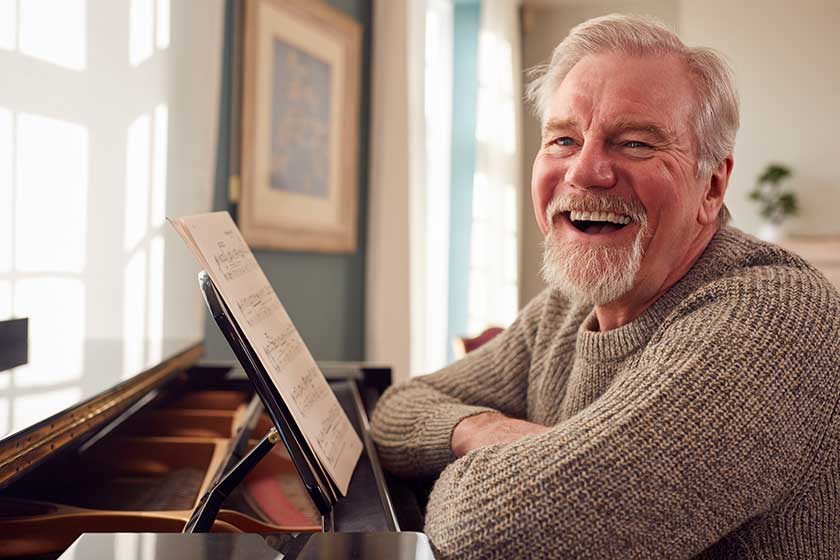Embarking on the journey of learning piano as a senior can be a fulfilling endeavor for individuals in their later years, providing not only a source of joy and relaxation but also numerous cognitive benefits. This guide offers valuable insights and practical tips to help you start this enriching musical voyage. Whether you’re exploring new hobbies or reigniting a lifelong passion for music, the piano offers a versatile and engaging experience.
The Benefits of Musical Exploration at an Advanced Age
Learning an instrument later in life comes with a unique set of advantages. Engaging in musical activities, such as playing the piano, has been shown to improve mental acuity, enhance memory and foster emotional well-being.
The process of learning and playing music stimulates various brain areas, contributing to improved cognitive function and a heightened sense of personal achievement. Moreover, music serves as a universal language that promotes social interaction and connectivity, essential aspects of maintaining a vibrant and fulfilling life.
Starting Your Musical Journey: Choosing the Right Instrument
When it comes to selecting a piano, several options cater to different needs and preferences. Digital pianos offer a practical and space-saving solution with the added benefit of volume control and headphone connectivity for private practice.
Acoustic pianos, on the other hand, provide a traditional and authentic musical experience with their rich tones and dynamic range. Consider factors such as space, budget and personal preferences when making your choice. Consulting with music professionals or visiting local music stores can provide valuable guidance in selecting an instrument that best suits your journey.
Creating a Practice Routine That Works for You
Developing a consistent practice routine is crucial for progress. However, it’s essential to approach practice sessions with flexibility and patience. Start with short, manageable sessions that focus on simple pieces or exercises, gradually increasing complexity and duration as confidence and skills develop. Remember, the goal is to enjoy the process and celebrate small achievements along the way. Integrating music into your daily routine can transform practice into a highly anticipated part of your day.
Leveraging Technology and Resources for Learning
The digital age offers an abundance of resources for learners, including online tutorials, apps and virtual lessons. These tools provide the flexibility to learn at your own pace and on your schedule. Many platforms cater specifically to beginners and offer step-by-step guidance, making it easier to start and progress. Additionally, certain communities may include access to online and offline retirement community events designed to enrich residents’ lives through music.
Connecting with Others Through Music
Music has the power to bring people together, creating opportunities for socialization and shared experiences. Participating in music groups or ensembles within your community can enhance your learning experience. Collaborating with fellow music enthusiasts offers encouragement, motivation and the joy of making music together. It’s also a wonderful way to form new friendships and connect with others who share similar interests.
Staying Motivated and Embracing the Learning Process
One of the key aspects of learning piano at an advanced age is maintaining motivation and a positive outlook. Set realistic goals, and recognize that every individual progresses at their own pace. Celebrate your progress, no matter how small, and be patient with yourself during more challenging phases. The journey of learning piano is as much about enjoying the moment and the music you create as it is about achieving proficiency.
Finding Support and Guidance
Seeking guidance from experienced instructors can significantly enhance your learning experience. A good teacher can provide personalized feedback, help you overcome technical challenges and keep you motivated. Many communities offer exclusive senior living programs that include music lessons or workshops, providing convenient access to quality instruction and support.
Learning piano in your later years can be a deeply rewarding experience, offering not just a new skill but a source of joy, a way to enhance cognitive function and an opportunity for social engagement. Whether you’re pursuing piano for the first time or returning to it after many years, the key is to embrace the journey with patience, curiosity and an open heart.







